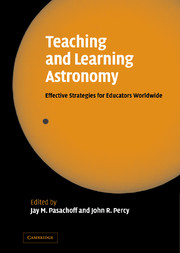Book contents
- Frontmatter
- Contents
- List of illustrations
- Preface
- Introduction
- Part I Astronomy in the curriculum around the world
- Part II Astronomy education research
- Part III Educating students
- Part IV Educating teachers
- Part V Astronomy and pseudoscience
- Part VI Astronomy and culture
- Part VII Astronomy in developing countries
- Part VIII Public outreach in astronomy
- Introduction
- 17 What makes informal education programs successful? (Total Solar Eclipse 2001 – live from Africa)
- 18 The role of science centers and planetariums
- 19 Science education for the new century – a European perspective
- 20 Communicating astronomy to the public
- Poster highlights
- Part IX The education programs of the International Astronomical Union
- Part X Conclusions
- Author index
- Subject index
17 - What makes informal education programs successful? (Total Solar Eclipse 2001 – live from Africa)
Published online by Cambridge University Press: 18 May 2010
- Frontmatter
- Contents
- List of illustrations
- Preface
- Introduction
- Part I Astronomy in the curriculum around the world
- Part II Astronomy education research
- Part III Educating students
- Part IV Educating teachers
- Part V Astronomy and pseudoscience
- Part VI Astronomy and culture
- Part VII Astronomy in developing countries
- Part VIII Public outreach in astronomy
- Introduction
- 17 What makes informal education programs successful? (Total Solar Eclipse 2001 – live from Africa)
- 18 The role of science centers and planetariums
- 19 Science education for the new century – a European perspective
- 20 Communicating astronomy to the public
- Poster highlights
- Part IX The education programs of the International Astronomical Union
- Part X Conclusions
- Author index
- Subject index
Summary
“Total Solar Eclipse 2001” - live from Africa
Abstract: Evaluation and assessments of informal education programs have been challenging because of the diverse nature of objectives, setups, and expected outcomes of these programs. Almost all institutions that develop and present such programs include evaluation specialists in their staff. However, for very large public outreach efforts, large evaluation groups/institutions can contribute more objective and extensive evaluation and assessment instruments that will help to identify whether the program was successful and if the learning objectives were achieved. Approximately 42,000 people participated in “Total Solar Eclipse 2001” at 164 public venues, including 21 museums internationally, science centers, and planetariums. We will expand further on the properties of this program that help to determine whether it was successful or not. Success can be affected by such issues as personal interest in the content, publicity, connectivity to a group, educational as well as entertainment value, and the challenges of using high technology.
Introduction
Informal education can be defined as the overlap between formal education (i.e., K-14 curriculum development, educator workshops, and links to systemic reforms) and public outreach (i.e., Internet, popular science articles, educational TV, radio programs). Informal education combines educational substance with public outreach, but without the pressure of examinations and assessment. More explicitly, it includes museum exhibits, science center programs, and planetarium shows. It can include educational activities carried out by community organizations such as scouts, girls and boys clubs, 4H, and other youth groups. It engages students, educators, and the general public in settings away from the classroom; provides learning opportunities, and motivates further learning and lifelong interest (Morrow, 2000).
- Type
- Chapter
- Information
- Teaching and Learning AstronomyEffective Strategies for Educators Worldwide, pp. 217 - 220Publisher: Cambridge University PressPrint publication year: 2005



